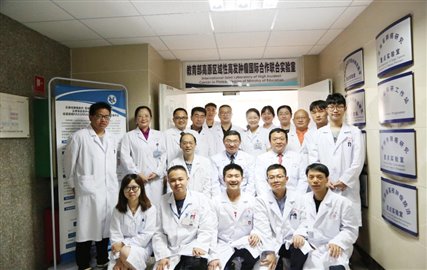The Joint International Research Laboratory of High-incidence Tumors in Plateau Region of the Ministry of Education of the People's Republic of China was established in November 2016. For years, a substantive cooperation between the lab and University of Alberta, Canada has been sustained, and the lab running strictly follows the "International Joint Laboratory Management Measures". Professor Huang Yunchao serves as the director of the laboratory, he is also the Director of Yunnan Cancer Hospital (the Third Affiliated Hospital of Kunming Medical University, refer to the same entity), Director of Yunnan Cancer Center.

Professor Huang Yunchao, Director of Joint International Research Laboratory of High-incidence Tumors in Plateau Region of the Ministry of Education

Members of Joint International Research Laboratory of High-incidence Tumors in Plateau Region of the Ministry of Education
Series of original studies concentrating on clinical research, etiology and mechanism research, transformation medicine of plateau regional high incidence tumors has been carried out based on the the biobank of Yunnan Cancer Hospital, with research focusing on lung cancer with regional high incidence, plateau ultraviolet radiation-related skin cancer, multi-ethnic tumor gene variation spectrum, plateau natural medicine radiation protection research and altitude tumor hypoxia adaptation. Major breakthroughs have been achieved in molecular epidemiological investigation, screening and early diagnosis of high-risk groups, etiology and pathogenesis research. Clinical transformation and application have been realized. The research results provide vital support for improving the epidemiological status of plateau tumors and accurate diagnosis and treatment, and generate decision support for the government to formulate comprehensive prevention and control strategies for high-incidence lung cancer in Wumeng Mountain area of northeast Yunnan Province and high-light skin tumor. At the same time, the first tumor biobank qualified to store human genetic resources in western China was set up in the lab, which provided a guarantee for the study of human tumor genetic diversity and tumor pedigree in multi-ethnic areas of China.

In terms of international cooperation results and talent training, we build a research platform that allow personnel exchanges
with our partners and cultivated professional and technical personnel at home and abroad. As a result, 28 doctoral students, 155 master students and 6 post-doctoral students finished their co-training here. Based on bilateral cooperation, the lab expanded exchanges and cooperation with Johns Hopkins University, MD Anderson Cancer Center in USA and national cancer institutions in South and Southeast Asia. Talents cultivated by the lab were awarded as the Leading talents in Science and Technology Innovation and Young and Middle-aged leading talents in Science and Technology Innovation by the Chinese Ministry of Science and Technology. It has jointly held several internationalconferences, undertaken international bilingual courses, which has effectively improved the innovation capability of Kunming Medical University, promoted oncology discipline, and successfully built a platform of tumor research for exchanges at home and abroad in Southwestern China.
Landmark achievements of collaborative innovation have been made. 83 national research projects were newly increased. 49 academic papers in science citation index database were published. 16 monographs were edited. 2 monographs on cancer were translated. And we participated in the formulation of 9 national tumor related diagnosis and treatment guidelines. We have won 3 special awards and 2 first prizes of Science and Technology Progress in Yunnan Province. What’s more, the lab has supported the establishment of Translational Research Laboratory of Yunnan Cancer Hospital, State Key Laboratory of Molecular Oncology, Demonstration Laboratory of Molecular Detection of Pathology Quality Control and Evaluation Center of National Health Commission of the People's Republic of China (PQCC), Yunnan Provincial Molecular Pathology Base for the Diagnosis and Treatment of Lung Cancer and Intestinal Cancer, Chen Jiejie Academician Workstation of Canada, Zhan Qimin Academician Workstation and Lung Nodules - Integrated Diagnosis and Treatment Center for Lung Cancer, Yunnan Tumor Molecular Gene Center, Yunnan Tumor Precision Diagnosis and Treatment Engineering Research Center and Yunnan Tumor Biobank.
The laboratory is equipped with cutting-edge experiment facilities, including: first-generation gene sequencer, second-generation high-throughput gene sequencer, third-generation long-read gene sequencer, digital PCR instrument, micro-cutting system and SCIEX QTRAP mass spectrometer, super-speed centrifuge, real-time quantitative gene amplification instrument, biological analyzer, high-performance liquid chromatography, supercomputer and micro comfocal microscope. All facilities have been involved in Yunnan Province Large Instruments and Equipment Sharing Management Platform and open to research institutions inside and outside the province.

The laboratory adheres to the core values of "preciseness, refinement, diligence and dedication" and the concept of "truth-
seeking, pragmatic, open and united", and attaches great importance to innovation-driven international integration. It has established long-term cooperative relations with National Cancer Institute (NCI), MD Anderson Cancer Center in USA, Humboldt University in Germany, Vienna General Hospital in Austria, Chinese University of Hong Kong, Peking University, Cancer Hospital of Chinese Academy of Medical Sciences, Guangdong Provincial People’s Hospital and Cancer Hospital Affiliated to Sun Yat-sen University. A grand platform has been built to facilitate professionals exchanging and cultivation. The lab collaborated with the University of Alberta, Canada, to jointly develop a portable mobile diagnostic test device for lung cancer molecular markers and nanotechnology and a number of international cooperation projects were jointly applied with our partners.
The laboratory attaches importance to social services and is open to the public. It sets up an Open research fund every year. As a sub-venue of the Laboratory Open Day of the Chinese Society of Cell Biology, the laboratory welcomes 300-500 middle school students and college students to visit and study every year, playing a positive role in carrying out public health science popularization education and promoting the dissemination of medical culture.
In terms of management and standardized operation, the laboratory has a clear organizational structure and established a complete management and operation system on academic supervision, biosafety and fund utilization, ensuring international openness, sharing and efficient operation. In order to achieve accurate and detailed typing of tumors and build a high-level international joint laboratory, we have laid out precision medicine plan for regional high-incidence tumor diseases,, a whole-chain and multi-dimensional translational medicine research system combining clinical and basic conditions and a precision big data platform covering molecular diagnosis and epidemiology of regional high-incidence tumors in plateau area.

